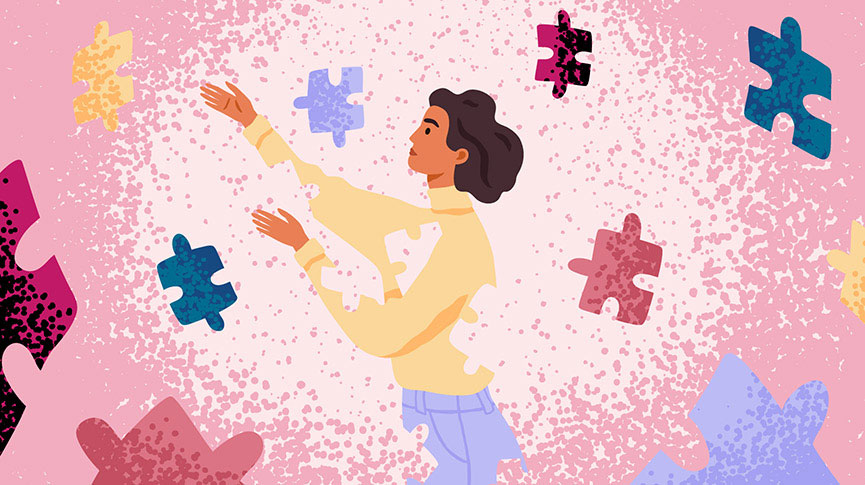PMS vs PMDD: What You Need to Know for Your Monthly Mental Health

PMS, or Pre-Menstrual Syndrome, is one of the most common, medically-recognized issues for menstruating women. In fact, you’ve probably heard any number of female family members gripe about PMS before you even really knew what a period was. Symptoms of PMS usually involve some combination of mood swings, cramps, tenderness of the breasts, and bloating or other gastro-intestinal discomfort. While certainly annoying, most of us can still manage to get through the day, albeit with the help of a few aspirin or chocolate.
PMS has an ugly, evil step-sister you’ve probably never heard of: PMDD. Pre-Menstrual Dysphoric Disorder is like PMS in its core symptoms – physical discomfort and moodiness – but that’s where the similarities end. This monster of a bonafide psychiatric disorder was only recently added to the Diagnostic and Statistical Manual of Mental Disorders. If you’ve tried to get help for this confusing mental health issue in the past, you might have been slapped with a label of general depression, which is different from PMDD. Clinical depression can last for weeks or even months, while PMDD only presents itself around the time you’d normally get PMS.
PMDD is often caused by some of the same brain chemical-related issues as depression. Some doctors point to genetics and a sensitivity to allopregnanolone, a neurosteroid that can affect progesterone levels, and in turn neurotransmitters like serotonin. In short, when these chemicals are out of whack, your mood can seriously suffer.
We know you want to power through your period like the tough, goal-oriented babe that you are, but if you’re feeling like the world is coming to an end about a week before Aunt Flo visits, it might be time to see a doctor. We’ve explored some key differences between PMS and PMDD that can help in deciphering whether you’ve just got a nasty case of the monthly blues, or a serious medical condition in dire need of treatment.
Mood Swings vs Depression, Anger, & Anxiety
Typical PMS is bound to leave you riding an emotional rollercoaster. Those adopt-a-puppy advertisements might actually induce tears, and if your partner forgets to kiss you upon returning from work, it might feel more personal than forgetful. When you’ve got PMDD, calling your mental symptoms “mood swings” is an understatement.
An obnoxious acquaintance, usually moderately annoying the rest of the month, might send you into an outburst of rage. While trying to clean up a bit at home, you’re so overcome with feelings of sadness that you call it a night, skip dinner, and lie awake crying in bed. When you consider your future career, your usual go-getting attitude is replaced with so much fear and anxiety that quitting feels like a more rational choice. You might even have thoughts of ending your life, which is enough of a reason alone to seek professional help.
PMDD, much like other types of depression, consumes your entire mental state, and the symptoms are too strong to ignore. It will be almost impossible to feel like getting out of bed in the morning or doing something as simple as calling up your regular hair stylist for your 6-week trim. If you’re noticing that life’s daily tasks feel like climbing mountains, it’s probably time to visit your general practitioner for a referral to a psychiatrist.
Feeling Blue vs Giving Up on Your Passions
When you’re PMS-ing, your daily workout routine or even getting off the couch to take Fido for a walk might not seem that appetizing. You might skip running after work for a day or two, and ol’ Spot might be relegated to a few minutes in the backyard instead of an hour-long stroll. Down-sizing your usual go-to activities for health and happiness is fairly normal just before or during your period. However, if you suspect PMDD, you’ll notice a much more noticeable change in how you feel about your life.
Your usual passion for making jewelry may completely dry up, leading you to seriously consider dumping your crafting supplies in the trash. Visits to see a beloved niece or nephew, which usually bring instant cheer at the thought of those tiny hugs, can’t even get you to crack a smile. And even though things are going great at your dream job, you just can’t find a reason to keep up with your usual efforts. In fact, you feel like you might as well just give up on the thought of career satisfaction.
It’s Ok to Ask for Help
PMDD is going to make you feel like everything you once loved isn’t worth it anymore, and you might be so sad, angry, or anxious that it’s impossible to put any effort into life. And even when you do get that promotion or visit your little niece, you still don’t feel happy or even content. If your pre-menstrual symptoms are less simply annoying and more astronomically life-changing, don’t be afraid to talk to a friend, significant other, or trusted family member about taking the next steps to seek medical help. PMDD can be significantly reduced with medication, exercise, and other basic lifestyle changes that also work for general depression. Even if you’re down in the dumps now, never forget that you’re worth a happy, healthy life.
Please note that advice offered by Intimina may not be relevant to your individual case. For specific concerns regarding your health, always consult your physician or other licensed medical practitioners.

Colleen Godin is a sexual wellness writer and journalist. She operates a one-woman business at ThePleasureConnection.net, specializing in copywriting, marketing and events for the greater pleasure industry. In her spare time, she enjoys disappearing into the forest, finding herself in a great song, and long drives during spontaneous road trips.


